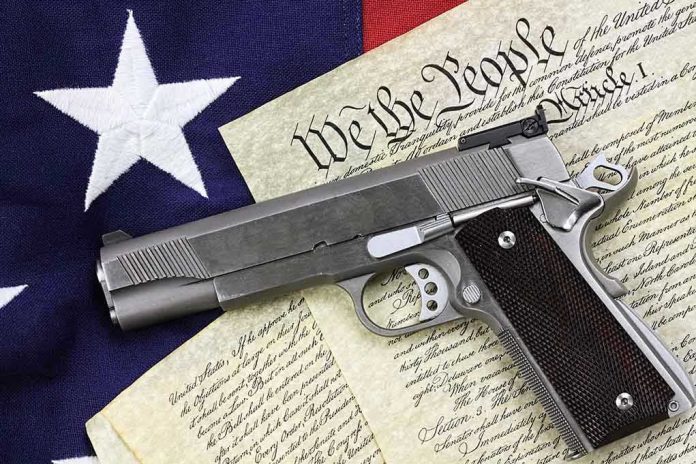
Gun rights advocates are taking the fight to court, arguing that with Congress poised to eliminate the National Firearms Act (NFA) tax, what remains is nothing more than an unconstitutional federal gun registry.
Story Snapshot
- Congress advances a bill to reduce the NFA excise tax from $200 to $0, igniting a fierce constitutional debate.
- Second Amendment groups argue the NFA now functions solely as a registry, which they claim violates the Constitution.
- Gun rights organizations file lawsuits and rally support, while gun control advocates warn of public safety risks.
- Legal and political battles over the future of federal firearms regulation intensify as the bill nears final passage.
Congress Strips Tax, Leaving Only Gun Registry
In July 2025, the Senate passed the “One Big Beautiful Bill,” a sweeping legislative package containing a provision to reduce the National Firearms Act (NFA) excise tax on items like suppressors and short-barreled firearms from $200 to $0. The bill is now awaiting final approval in the House, with advocates and opponents locked in a heated constitutional debate. Gun rights groups, led by the NRA-ILA, Gun Owners of America, and the National Shooting Sports Foundation, argue that removing the tax strips the NFA of its original Depression-era rationale and leaves behind a registry they say is unconstitutional without a valid tax purpose.
The NFA was enacted in 1934 to address gang violence by imposing a prohibitive tax and a registration requirement on certain firearms and accessories. Over the decades, inflation eroded the impact of the $200 tax, but the registration regime remained intact. With Congress now set to eliminate the tax entirely, Second Amendment advocates insist the law’s only remaining function is to track gun ownership, which they contend the founders never intended.
Second Amendment Advocates Launch Legal Challenge
As the bill advances, gun rights groups have filed lawsuits to challenge what they call a “registry-only” NFA. The NRA-ILA and Gun Owners of America argue that the Supreme Court previously upheld the NFA as a tax measure, not as a means of tracking law-abiding citizens. They believe the removal of the tax undermines the law’s constitutional standing and gives the federal government unprecedented power to surveil firearm owners without due justification. Their legal briefs assert that “a federal registry of firearms is a direct affront to the Second Amendment and the privacy of American citizens,” and are urging lawmakers to go further by fully removing suppressors and short-barreled firearms from the NFA altogether.
Gun rights organizations are rallying supporters, urging them to contact their representatives and demand a complete overhaul or repeal of the NFA. The stakes are high: with the tax gone, the focus shifts to whether the courts will uphold a law that, in the eyes of many, now serves solely as a tool for federal oversight—something that runs counter to conservative principles of limited government and individual freedom.
Opposition, Revenue Loss, and Political Fallout
Not all are in favor of these changes. Senator Chris Murphy and other gun control advocates have introduced counter-proposals to dramatically increase NFA taxes, arguing that removing the tax will undermine public safety and regulatory oversight. They claim the registry is necessary to monitor the flow of potentially dangerous weapons and accessories, and warn that removing financial barriers will flood the market with items like suppressors, complicating law enforcement efforts. National Shooting Sports Foundation analysis estimates that the federal government could lose $1.7 billion in revenue over ten years for suppressors alone, with an additional $295 million loss from short-barreled firearms.
Political divisions are clear. Republican lawmakers and President Trump’s administration are pushing for expanded gun rights, seeing the NFA tax repeal as part of their broader effort to roll back what they describe as government overreach. Meanwhile, Democrats and gun control groups are doubling down on arguments that loosening federal restrictions will increase risks to public safety and make it harder to prevent gun-related violence.
Legal Uncertainty and the Road Ahead
The bill’s rapid progress comes amid heightened polarization over gun rights and government oversight. Legal scholars note that the Supreme Court’s historical support for the NFA was tied to its function as a tax; with that foundation removed, the courts may look differently at a registration-only regime. This uncertainty sets the stage for protracted legal battles, with both sides preparing for a fight that could reshape federal firearms policy for years to come.
Short-term, gun owners and manufacturers stand to benefit from reduced costs and fewer bureaucratic hurdles. Long-term, the outcome of the legal challenges will determine whether the federal government retains the ability to maintain a registry of certain firearms and accessories, or whether the NFA’s remaining provisions collapse under constitutional scrutiny. As the House prepares for a final vote, and advocacy groups mobilize, the future of federal gun regulation hangs in the balance, reflecting a broader struggle over constitutional rights, government power, and the American way of life.
Sources:
NRA-ILA legislative alert: One Big Beautiful Bill Clears Senate
NRA-ILA: US House Committee Releases Plan to Remove Suppressor Tax
NSSF: Sen. Murphy’s Crushing NFA Tax Proposal
Gun Owners of America: Repealing NFA Excise Taxes is Byrd-Compliant



